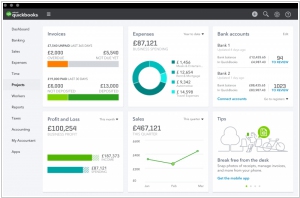QuickBooks vs SAP ERP
July 02, 2023 | Author: Michael Stromann
24
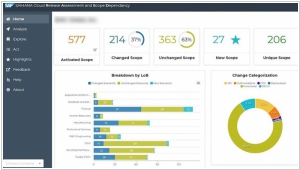
SAP’s intelligent ERP solutions are the Digital Core that enable businesses to integrate end-to-end cross functional next generation business processes so that companies can become intelligent. SAP's cloud ERP solutions use intelligent technologies to help you grow, innovate, and optimize time and resources – no matter the size of your business.
QuickBooks and SAP ERP are two popular software solutions that cater to different business needs and target different segments of the market.
QuickBooks is a small business accounting software that offers a user-friendly interface and features specifically designed for small and medium-sized businesses. It provides essential accounting functionalities such as bookkeeping, invoicing, expense tracking, and financial reporting. QuickBooks is known for its ease of use, affordability, and accessibility, making it a popular choice among small businesses and entrepreneurs.
SAP ERP, on the other hand, is an enterprise-level software suite that offers comprehensive solutions for various business processes, including finance, human resources, procurement, inventory management, and more. It is designed to handle the complex needs of large organizations and provides extensive customization and integration capabilities. SAP ERP offers advanced features for multi-company management, international operations, and industry-specific requirements, making it suitable for medium to large enterprises.
See also: Top 10 Online ERP software
QuickBooks is a small business accounting software that offers a user-friendly interface and features specifically designed for small and medium-sized businesses. It provides essential accounting functionalities such as bookkeeping, invoicing, expense tracking, and financial reporting. QuickBooks is known for its ease of use, affordability, and accessibility, making it a popular choice among small businesses and entrepreneurs.
SAP ERP, on the other hand, is an enterprise-level software suite that offers comprehensive solutions for various business processes, including finance, human resources, procurement, inventory management, and more. It is designed to handle the complex needs of large organizations and provides extensive customization and integration capabilities. SAP ERP offers advanced features for multi-company management, international operations, and industry-specific requirements, making it suitable for medium to large enterprises.
See also: Top 10 Online ERP software
QuickBooks vs SAP ERP in our news:
2023. Intuit launches generative AI–powered digital assistant for small businesses and consumers
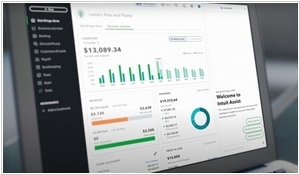
Intuit, the prominent U.S. financial and accounting software company, has introduced its inaugural customer-centric generative AI-driven solution known as Intuit Assist. Functioning as a digital assistant, it is seamlessly integrated into Intuit's suite of platforms and products, including TurboTax, Credit Karma, QuickBooks, and Mailchimp. With a consistent user interface, Intuit Assist leverages contextual datasets to deliver personalized recommendations to the company's vast customer base of over 100 million small businesses and consumers worldwide. This innovative offering also facilitates human assistance through Intuit's live platform when necessary. The digital assistant was created using GenOS, Intuit's proprietary operating system based on generative AI, which was launched in June to empower developers in incorporating AI across the company's product portfolio.
2021. SAP is buying Berlin business process automation startup Signavio
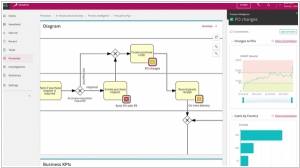
SAP has recently completed its acquisition of Signavio, a business process automation startup, for approximately $1.2 billion. This move reflects SAP's recognition of the value in adopting a more modern and cloud-native approach to address the challenges of enterprise business process automation. The ability to automate business processes through the cloud has gained significant importance, especially during the pandemic when remote work has become prevalent. By incorporating Signavio's cloud-native tool into its portfolio, SAP aims to enhance its capabilities in automating and optimizing business processes. SAP also views Signavio as a valuable addition to its business process intelligence unit, filling a crucial gap in its offerings.
2020. Intuit acquires inventory management software TradeGecko

Intuit, a US-based business and financial software company, has made a deal to purchase TradeGecko, a Singaporean software-as-a-service company specializing in online inventory and order management software for small businesses. The acquisition, valued at $80 million, aims to combine TradeGecko's inventory and order management capabilities with Intuit's QuickBooks accounting platform. This integration will enable QuickBooks Online customers to effectively launch and oversee products across online and offline sales channels. Additionally, they will be able to handle orders and inventory fulfillment from different channels and multiple inventory locations, as stated in the announcement.
2017. Intuit acquired time-tracker TSheets
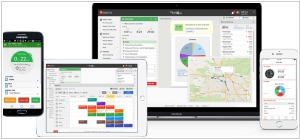
Intuit, the company renowned for products like QuickBooks, has recently made a significant acquisition. They have acquired TSheets, a time-tracking service and employee scheduling app with a customer base exceeding 35,000, for a total of $340 million. Given the substantial overlap in their target markets, primarily catering to small and medium-sized businesses, it's evident that QuickBooks and TSheets complement each other. In fact, Intuit reveals that the two companies already share 12,000 customers, indicating an existing synergy. This acquisition is not primarily aimed at acquiring new customers but rather at enhancing the QuickBooks ecosystem. It's worth noting that TSheets already integrates with QuickBooks. Throughout my discussions with Intuit in recent months, it has become apparent that their current product plans revolve around minimizing friction, particularly in relation to QuickBooks, aligning with their commitment to creating seamless experiences for their users.
2014. Intuit acquired cloud integration service ItDuzzit
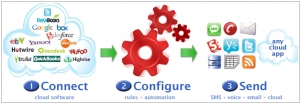
Intuit is further expanding its cloud platform for small and medium-sized businesses (SMB) through the acquisition of itDuzzit, a startup offering integration tools for connecting various web and mobile apps within enterprises. This can be likened to the functionality of IFTTT but tailored for business needs. Intuit's intention is to incorporate itDuzzit into its QuickBooks platform, which not only provides accounting services but also offers a growing range of additional services for businesses. itDuzzit competes with similar platforms like Zapier and Cloudwork. The platform currently supports integration with numerous apps, including Asana, Box, Coinbase, Freshbooks, PayPal, and Shopify, with the promise of adding more apps in the future. In essence, this acquisition allows Intuit to provide its customers with a seamless way to utilize these integrated apps on its platform, alongside Intuit software, even if Intuit doesn't have a direct hand in each of those services.
2014. Intuit buys Lettuce for $30M to add inventory and order management to Quickbooks
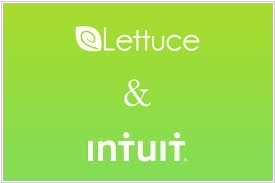
Intuit has expanded its portfolio by acquiring Lettuce, a platform designed for online order and inventory management, aiming to solidify its position as the leading provider of cloud-based office solutions for small and medium businesses. Unlike typical acquisitions where the purchased product is either shut down or its technology repurposed for a new service, Intuit plans to keep Lettuce functioning as an independent application. Additionally, Intuit intends to enhance the integration of Lettuce into its flagship small and medium business accounting product, Quickbooks, building upon the existing integration to provide a more comprehensive solution.
2012. SAP became NetSuite's customer. Business ByDesign will be closed
Most of all NetSuite loves trolling its rival - SAP. From time to time they organize anti-SAP conferences, marketing campaign a la Business ByNetsuite and produce videos like that one above. And they haven't missed the opportunity to joke on SAP at this time. At the opening of the conference SuiteWorld, Zach Nelson (CEO of NetSuite) took the stage and announced that in the past year the company has achieved their biggest ever win: ERP-giant SAP has become NetSuite's customer. The audience was shocked, and then Zach explained. ***
2011. SAP embracing Amazon and Microsoft clouds

SAP is the most slow IT giant in terms of transition to the cloud technologies. Nevertheless, it's the world's largest software company and any of its steps to the Cloud serves as an indicator for all large corporations: "if even SAP released a SaaS-solution, then SaaS-solutions can indeed be trusted" or "if even SAP offers a version for Amazon Web Services, than this platform is really enterprise-ready". This week at the SAPPhire conference, the company reported on its cloud transition steps. First of all, the SaaS ERP-service SAP Business ByDesign is already used by 500 with a target of having 1000 signed up by the end of the year. Second, SAP has announced that it's "launching" the SaaS CRM-service SAP Sales OnDemand, which will be followed by a travel management cloud service and an on-demand suite for talent management. And third, SAP has started to adapt its existing systems for the Amazon and Microsoft cloud platforms. ***
2010. Who says Enterprise Software isn’t Cool? Watch what its users can do!
In addition to focusing on new business applications and modern trends in Enterprise software, we also pay attention to how vendors promote themselves and their products. This area is shifting towards the Enterprise 2.0 style, where traditional PowerPoint presentations and image-less PDF brochures are being replaced by captivating blockbusters and show-projects. Instead of mundane descriptions, we now encounter humorous sketches illustrating the consequences of running a business without the software. Such marketing strategies grab attention and, most importantly, foster a sense of affinity towards the software, even if the software itself is not particularly user-friendly, as is the case with SAP. SAP's latest show-project, Run Better, focuses on showcasing the remarkable achievements of its users rather than emphasizing the ERP system itself. Additionally, other examples of captivating marketing can be found from Box.net, Mainsoft, and NetSuite.
2010. SAP Business ByDesign goes live
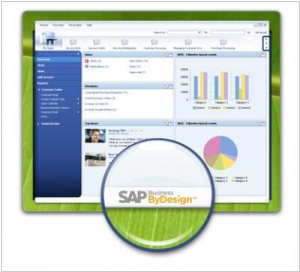
Finally, SAP has officially launched its SaaS ERP system, SAP Business ByDesign, which will compete with NetSuite, Workday and other cloud ERP solutions. As you know, it's not a fresh product. It was released 3 years ago, but due to the scalability problems, its sales were stopped, and still the system was used by fewer than 100 companies worldwide. SAP Business ByDesign is designed for SMB (50-500 employees) and primarily for manufacturing and professional services industries. It's a single multitenant service to automate all business areas, including manufacturing, financials and sales. The updated version SAP Business ByDesign 2.5 provides support for mobile devices, integration with MS Excel, custom forms and user interface based on Silverlight. But its pricing will hardly cause a revolution in SaaS sphere. ***

